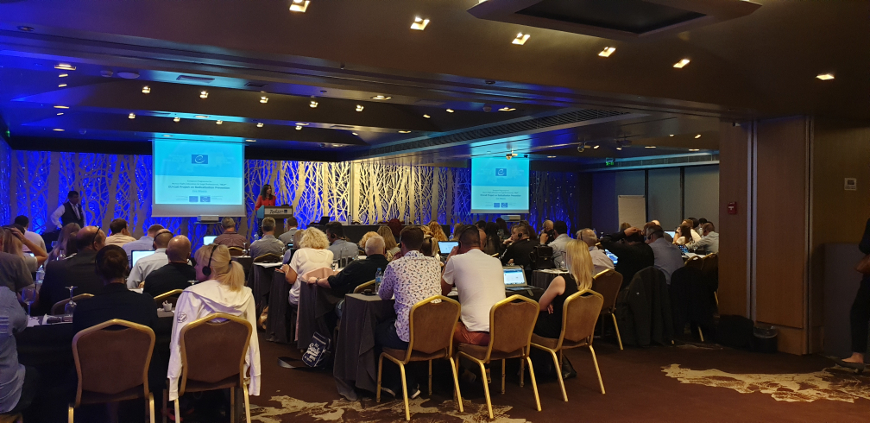The EU-Council of Europe HELP Course on Radicalisation Prevention was launched in Athens on 2 and 3 May 2019, for over 70 prison and probation staff from Greece, Germany and members of the Confederation of European Probation (CEP), of different nationalities. This is the first time a HELP course is designed and implemented for prison and probation services, professionals dealing directly with the issue of radicalisation.
Experts in the area of radicalisation provided an overview of the various initiatives and projects being developed at an international level in relation to radicalisation prevention.
Participants got familiarised with the Human Rights Education for Legal Professionals (HELP) Programme of the Council of Europe and its e-learning platform containing more than 30 online courses. They were also introduced to the tutors who will accompany them in the implementation of the course for the next three months, Dimitra Drakaki, Manager of Agia Agricultural Prison, Chania, Crete in Greece, Lars Dietze, Senior Corrections-Officer, group-leader, Bremen Penitentiary in Germany, Stephan Schnaars, Senior Corrections-Officer, duty-officer, Bremen Penitenciary in Germany and Ioan Durnescu, Professor at Bucharest University and CEP representative in Romania.
The event started with opening speeches from Maria Gianakaki, Secretary General for Human Rights in the Ministry of Justice, Transparency and Human Rights of Greece, who welcomed all participants, tutors and guest speakers. Eva Massa, Radicalisation Prevention Project Coordinator in the HELP Unit of the Council of Europe, provided an overview of the EU-Council of Europe HELP “Project on Radicalisation Prevention” –funded by the EU and the Council of Europe and implemented by the latter, as well as a detailed explanation of the format and content of the course. She highlighted the fundamental role that the Council of Europe has played in the fight against terrorism, its financing and countering radicalisation, being one of the main international organisations tackling these phenomena from the angle of prevention.
Donche Boshkovski, from the Criminal Law Cooperation Unit (CLCU) of the Council of Europe, explained the actions of the CLCU in addressing radicalisation in prisons, including the adoption of the "Guidelines for prison and probation services regarding radicalisation and violent extremism" and the training of prison staff to promote dynamic security and ensure better use of prison staff skills and knowledge. He also presented the Council of Europe projects in the Western Balkans focusing on addressing radicalisation and violent extremism in prisons, as well as the upcoming regional project under Horizontal Facility II, which will involve the launch of the HELP module for prison and probation staff in all six Western Balkans beneficiaries (adapted the specific needs of the region).
Vera Tkachenko, Crime Prevention and Criminal Justice Officer in the Justice Section of United Nations Office on Drugs and Crime (UNODC), described the work of the UN in the area of radicalisation to violence in prisons and the existing challenges. She addressed risk and needs assessment, disengagement and good prison management in line with the Nelson Mandela Rules. She also shared with participants the UNODC handbooks on different issues related to prison reform and alternatives.
Maria-Andriani Kostopoulou, member of the HELP Consultative Board, provided a comprehensive overview of Council of Europe and EU standards and tools related to counter-terrorism and prevention of radicalisation. She also highlighted the impact of this problem on vulnerable groups, in particular children, and the initiatives implemented to address this impact, such as PACE Resolution 2103 “Preventing the radicalisation of children and young people by fighting the root causes” or the Compass Manual for Human Rights Education with Young People (covering terrorism).
The four HELP tutors delivered a very insightful presentation sharing their personal experience working in their respective institutions: the agricultural prison in Chania, Greece, the daily work and challenges at Bremen´s prison in Germany and the very active role of the CEP in Romania.
Participants had the opportunity to have a training session with their national tutors in smaller groups, per country, where they shared their expectations from the course and their willingness to contribute to the exchange of ideas and opinions on their respective national versions of the course. This session was extremely practical as it assisted participants in becoming familiar with the HELP platform, the structure, timeline and elements of their national version of the course, as well as providing a unique opportunity for networking with other participants.
All participants who successfully complete the course launched under the joint EU-Council of Europe project on Radicalisation Prevention will receive HELP certificates issued by the Council of Europe and their respective national training institutions.
The first two modules of this course are available in English in the self-learning part of the HELP e-learning platform, open for professionals interested in the topic.

Group photo of participants from the first cross-border course launch on Radicalisation prevention for prison and probation staff. © Council of Europe



